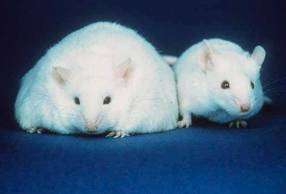20 years of leptin – the obesity related hormone

2014 marks the 20th anniversary of the discovery of leptin – the hormone that tells our brains when we've eaten enough and the first reported genetic basis for obesity. The discovery will be celebrated this month in a special edition of the Journal of Endocrinology devoted to the hormone.
Leptin, a hormone produced by fat cells, relays important signals to the brain about the status of energy stores in the body. Often known as the satiety hormone, leptin functions to tell us when we're full and so, when it's time for us to stop eating. In addition to regulating the body's natural weight control mechanism, leptin has also been show to play a key role in male and female fertility.
Leptin has recently been approved as a licensed, prescription medicine in both Japan and the USA for the treatment of obesity. While the scope for leptin-based treatment for all obesity cases is limited at present, a deeper understanding of leptin and appetite may widen its therapeutic impact.
Professor Sir Steve O'Rahilly, President of the Society for Endocrinology and Professor of Clinical Biochemistry and Medicine at University of Cambridge carried out the initial studies of leptin. In his Editorial in this special issue he says, "In the short space of 20 years, leptin has moved from the research journal to physiology textbooks and from the laboratory to the clinic."
Dr Jeffrey Freidman, a scientist from New York, discovered leptin in 1994 when he found that mutations in a certain area of the genome caused severe obesity in mice (Image 1). His discovery shook the scientific world; not only was this the first evidence of a genetic basis for obesity but the hormone concerned was being produced by fat cells – never before had fat been considered as an endocrine organ.
Overweight and obesity are leading causes of death globally; with around 3.4 million adults dying each year as a result of being overweight or obese. In addition, 44% of the diabetes burden, 23% of the ischaemic heart disease burden and between 7% and 41% of certain cancer burdens are attributable to overweight and obesity. Over the last twenty years a lot of work has gone into understanding the pathways of hunger and satiety in humans; this has provided important insights into our relationship with food, appetite, satiety and how they've changed throughout evolution.
When asked about the future of leptin research, Professor O'Rahilly said, "There is still much to do to illuminate the biological functions of this fascinating hormone and to optimise its use to benefit human health". In conclusion, he added, "I look forward to the 30th anniversary. I'm sure there will have been some fascinating developments!"
More information: The Journal of Endocrinology Leptin issue can be accessed online from 23 September 2014 at joe.endocrinology-journals.org/



















